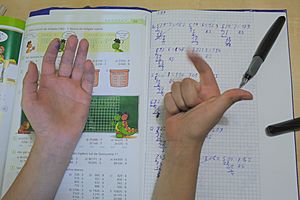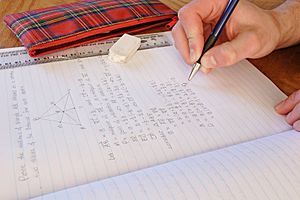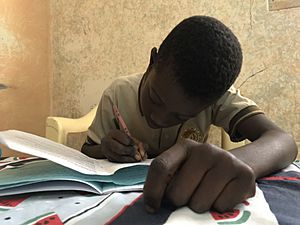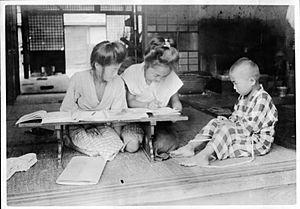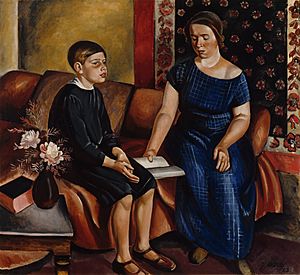Homework facts for kids
Homework is school work that students are given by their teachers to do at home. It's like practice that helps students remember what they learned in class. It also helps them review topics.
The amount of homework students get can be different. It usually depends on how old they are and what grade they are in. Older students often get more homework than younger ones.
Teachers give homework for many reasons, including:
- Practice: To help you practice what you learned.
- Preparation: To get you ready for new topics.
- Participation: To involve you more in your learning.
- Personal development: To help you grow and learn on your own.
- Parent–child relations: To give parents a chance to see what you're learning.
- Parent–teacher communications: To help teachers and parents talk about your progress.
- Peer interactions: Sometimes, homework involves working with classmates.
Homework can also help you learn how to be organized. It teaches you to work on tasks by yourself. It can also improve your time management and focus skills.
Contents
How Homework Affects Students
School Performance
People have different ideas about whether homework really helps students do better in school. What studies show can change based on things like the students' age and how "academic performance" is measured.
Some studies suggest that homework doesn't always improve grades for younger students in elementary school. However, some people who support homework say it helps kids learn good study habits. But there isn't much research to prove this idea.
For teenagers, spending more time on homework often leads to higher grades and better test scores. But there's a limit! Studies have shown that if teenagers spend more than 90 minutes a day on homework, their school performance can actually get worse.
Interestingly, students who are struggling in school often benefit more from doing homework than those who are already doing well. However, teachers sometimes give less homework to students who need it most. They might give more homework to students who are already performing well. In the past, homework could even make students drop out of school. If they couldn't keep up with the work, they might just quit.
Other Effects
The amount of homework you get doesn't always change how you feel about homework or school in general.
Some research suggests that homework can help students become more motivated and improve their study skills. In one study, parents and teachers thought homework helped middle school students learn to be responsible. However, the students themselves often felt negatively about homework. They were less likely to think it helped them develop these skills. Other studies found that students often felt negative emotions when doing homework. They were also less engaged compared to other activities.
A Look Back: The History of Homework
In the United States
For a long time, many people in the United States didn't like homework. Not many students went on to college back then. Also, many children and teenagers had to spend a lot of time doing chores or farm work. So, homework was unpopular with both parents and some schools. If students couldn't keep up with homework, which often meant memorizing texts at home, they might drop out of school early. Going to school wasn't always required by law.
Parents often complained about homework. In 1880, a man named Francis Amasa Walker convinced the school board in Boston to stop teachers from giving math homework. In 1900, a journalist named Edward Bok argued against giving homework to students under 15. He told parents to send notes to teachers demanding an end to homework, and thousands did! People also pointed out that school time plus homework could be more hours than a child was allowed to work for pay under new child labor laws. This led to experts telling the US Congress that children should never have homework. They also said teenagers should have no more than two hours of homework a day. In 1901, California even passed a law that basically got rid of homework for anyone under 15.
While homework wasn't popular in the first half of the 1900s, some people wanted to change it instead of banning it. They thought homework should be more connected to students' real lives outside of school.
In the 1950s, homework became popular again. This was because the United States wanted to stay ahead during the Cold War. Children were encouraged to keep up with students in the Soviet Union. Since then, attitudes about homework have changed every 15 years or so. It was popular from the 1950s to mid-1960s, then less popular until 1980. It became popular again from 1980 until the mid-1990s, when the Cold War ended. After the Cold War, homework became less favored again.
In the United Kingdom
Students in the United Kingdom tend to get more homework than many other countries in Europe. On average, they spend about 5 hours a week on homework. There's also a difference in the UK based on social class. Middle-class teenagers often get a lot more homework compared to students in Asia and other parts of Europe.
In Spain
In 2012, a report showed that children in Spain spend about 6.4 hours a week on homework.
Images for kids
See also
 In Spanish: Trabajo escolar para niños
In Spanish: Trabajo escolar para niños
 | George Robert Carruthers |
 | Patricia Bath |
 | Jan Ernst Matzeliger |
 | Alexander Miles |


